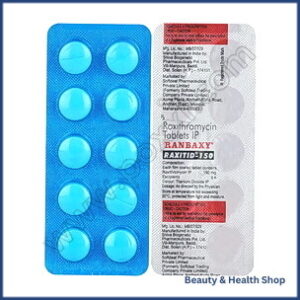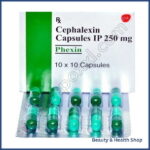ADDICTION
ALCOHOL DEPENDENCE
QUIT SMOKING
ALLERGY
ANTI FUNGAL
FUNGAL INFECTION
FUNGAL NAIL INFECTIONS
ANTI-REJECTION DRUGS
ANTI WORM
ANTIBIOTIC
BACTERIAL INFECTIONS
ARTHRITIS
GOUT
OSTEOARTHRITIS
RHEUMATOID ARTHRITIS
BLOOD
LOW PLATELET COUNT
THROMBOPHLEBITIS
VARICOSE VEINS
COLON
ANAL FISSURE
PILES
ULCERATIVE COLITIS
DIABETES CARE
DIABETES INSIPIDUS
DIABETES TYPE
DIABETIC FOOT ULCERS
GLUCOSE MONITOR
EYES/EAR CARE
DRY EYES
EYE CARE
EYE EXAMINATION
EYE INFECTION
EYE LASHES
EYE PAIN
GLAUCOMA
OCULAR HYPERTENSION
UVEITIS
FEVER CARE
MALARIA
RHEUMATIC FEVER
TYPHOID FEVER
GASTROINTESTINAL
ACIDITY
CONSTIPATION
CROHN'S DISEASE
DIARRHOEA
GALLBLADDER STONES
INTESTINAL ULCERS
IRRITABLE BOWEL SYNDROME
MOTION SICKNESS
NAUSEA
Erythrocin 500 mg (Erythromycin)
| Indication: | Bacterial Infections |
|---|---|
| Manufacturer: | Abbott India Pvt Ltd |
| Packaging: | 10 Tablets in a strip |
| Strength: | 500 mg |
From: $34.00
Erythrocin 500 mg, also known as Erythromycin, plays a significant role in combating various bacterial infections. From respiratory issues to skin ailments, this antibiotic serves an essential purpose in your healthcare arsenal. But have you considered the potential side effects and interactions that may arise during your treatment journey with this medication? Stay tuned to uncover essential insights that can help you navigate your Erythrocin 500 mg course with confidence and clarity.
Why is this medication prescribed?
Erythrocin 500 mg, also known as Erythromycin, is prescribed to treat various bacterial infections affecting different parts of the body. This medication belongs to a class of drugs called macrolide antibiotics, which work by stopping the growth of bacteria. Erythromycin is commonly used to treat infections such as pneumonia, bronchitis, ear infections, skin infections, and sexually transmitted diseases like chlamydia. It can also be prescribed for patients who are allergic to penicillin but still require antibiotic treatment.
In addition to these common uses, Erythromycin may also be recommended for individuals with acne or who have gastrointestinal issues caused by a specific type of bacteria. Your healthcare provider will determine the appropriate dosage and duration of treatment based on the type and severity of your infection. It is essential to complete the full course of medication as prescribed, even if you start feeling better before the treatment is finished. Be sure to follow your healthcare provider’s instructions carefully to achieve the best possible outcome.
How should this medicine be used?
To use this medication effectively, follow the dosage instructions provided by your healthcare provider. Erythrocin 500 mg (Erythromycin) is typically taken by mouth with or without food as directed by your doctor, usually every 6 hours. Swallow the tablets whole with a full glass of water to help prevent stomach upset. Do not crush or chew the tablets unless advised otherwise. If you are using the liquid form of this medication, carefully measure the dose using a special measuring device/spoon. Do not use a household spoon as you may not get the correct dose. Take this medication for the full prescribed length of time, even if your symptoms improve before the course is completed. Stopping the medication too early may allow bacteria to continue to grow, which may result in a relapse of the infection. If you have any questions about the proper usage of Erythrocin 500 mg (Erythromycin), consult your healthcare provider for further guidance.
Other uses for this medicine
Consider other potential uses for this medication as advised by your healthcare provider. Erythromycin, the active ingredient in Erythrocin 500 mg, is primarily prescribed to treat bacterial infections like respiratory tract infections, skin infections, and certain sexually transmitted diseases. However, it may also have other off-label uses that your healthcare provider might suggest. One such use is for individuals who are allergic to penicillin but require an antibiotic treatment, as erythromycin is an alternative option in such cases. Additionally, erythromycin has been used to help stimulate stomach contractions in individuals with delayed gastric emptying or other gastrointestinal motility disorders. In some cases, it may be prescribed to prevent bacterial endocarditis in individuals allergic to penicillin before dental procedures. It’s important to follow your healthcare provider’s guidance strictly when considering any off-label uses of erythromycin to ensure safe and effective treatment.
What special precautions should I follow?
When taking Erythrocin 500 mg (Erythromycin), it’s important to check for potential drug interactions with other medications you may be using. Be sure to inform your healthcare provider about any current medications or supplements to prevent adverse effects. Monitoring for interactions can help guarantee the effectiveness and safety of your treatment plan.
Check for Drug Interactions
Prior to consuming Erythrocin 500 mg (Erythromycin), make sure you review potential drug interactions to stay safe and avoid complications.
- Consult with your healthcare provider or pharmacist to identify any medications, supplements, or herbal products that may interact with Erythrocin.
- Inform your healthcare provider about any existing medical conditions, allergies, or previous adverse reactions to medications to prevent potential interactions.
- Be cautious when starting new medications while taking Erythrocin, as some drugs can interact adversely, affecting the effectiveness or safety of both medications.
What special dietary instructions should I follow?
To maintain peak absorption of Erythrocin 500 mg (Erythromycin), it is recommended to take this medication with a full glass of water. This helps the medication dissolve properly in your stomach and allows for maximum absorption into your bloodstream. Additionally, it is advised to take Erythrocin on an empty stomach, either 1 hour before or 2 hours after meals, unless otherwise directed by your healthcare provider. Certain foods, especially those high in fats, can interfere with the absorption of Erythrocin, reducing its effectiveness. Hence, try to avoid consuming fatty meals close to the time you take your medication. Dairy products can also decrease the absorption of Erythrocin, so it is best to space out your intake of these products from when you take the medication. Following these dietary instructions can help make sure that Erythrocin is absorbed efficiently, maximizing its therapeutic benefits in combating bacterial infections.
What should I do if I forget a dose?
In case you forget to take a dose of Erythrocin 500 mg (Erythromycin), promptly take it when you remember. However, if it is nearing the time for your next scheduled dose, skip the missed one and continue with your regular dosing schedule. Avoid taking a double dose to make up for the one you missed, as this can lead to an overdose. It is essential to maintain a consistent intake of this medication for it to be effective in treating your infection. Setting a daily reminder on your phone or using a pill organizer can help you remember to take your doses on time. If you frequently forget doses, consider talking to your healthcare provider for additional support or strategies to help you adhere to your medication schedule. Remember that consistency in taking your medication is vital for the treatment’s success and to prevent the infection from worsening.
What side effects can this medication cause?
Erythrocin 500 mg (Erythromycin) can cause side effects, some of which may be serious. It is important to report any persistent side effects to your doctor. If you experience symptoms such as severe stomach pain, yellowing of the eyes or skin, or unusual tiredness, seek medical attention promptly.
Report Persistent Side Effects
Experiencing persistent side effects from Erythrocin 500 mg, also known as Erythromycin, could indicate a need for medical attention. Some common side effects that may persist and require attention include:
- Severe stomach cramps
- Prolonged diarrhea
- Unusual fatigue
Important side effects can be concerning and may signal an adverse reaction to the medication. If you notice any of these symptoms lingering or worsening over time, it is important to consult your healthcare provider promptly. Monitoring and addressing these persistent side effects is vital to guarantee your well-being and to prevent any further complications. Your doctor can assess the situation, provide guidance, and suggest appropriate measures to alleviate these symptoms effectively.
Some side effects can be serious. If you experience any of the following symptoms, call your doctor immediately:
If you notice any of the serious side effects listed below while taking this medication, contact your doctor immediately.
- Severe stomach pain
- Yellowing of the skin or eyes
- Irregular heartbeat
These symptoms could indicate a severe reaction to Erythrocin 500 mg (Erythromycin) that requires immediate medical attention. Severe stomach pain might be a sign of a serious gastrointestinal issue. Yellowing of the skin or eyes could suggest liver problems. An irregular heartbeat may be a sign of an underlying heart condition exacerbated by the medication. It’s important to seek prompt medical help if you experience any of these symptoms to prevent potential complications and safeguard your well-being.
What should I know about the storage and disposal of this medication?
When storing or disposing of Erythrocin 500 mg (Erythromycin), make sure to keep it out of reach of children and pets. Store the medication at room temperature, away from moisture and heat. Make certain that the container is tightly closed to prevent exposure to air and humidity, which could affect the medication’s effectiveness. Do not store Erythrocin in the bathroom or near the kitchen sink, where it could be exposed to moisture.
If you have unused or expired Erythrocin tablets, do not flush them down the toilet or pour them into a drain unless instructed to do so. Instead, it is recommended to dispose of them properly. You can consult your pharmacist or local waste disposal company on how to safely dispose of medications. Some communities have drug take-back programs for safe disposal. It is essential to follow these guidelines to prevent accidental ingestion by children, pets, or others, and to protect the environment.
In case of an emergency/overdose
In an emergency or overdose situation involving Erythrocin 500 mg (Erythromycin), immediately contact poison control or seek medical assistance. If you suspect an overdose or experience severe symptoms such as severe stomach pain, vomiting, or irregular heartbeat after taking Erythrocin 500 mg, do not hesitate to seek help. When contacting medical professionals or poison control, be prepared to provide information such as the amount of medication taken, the time of ingestion, and any symptoms experienced. It is crucial to act quickly to prevent potential complications from an overdose of Erythrocin 500 mg. Medical professionals will be able to assess the situation, provide appropriate treatment, and offer guidance on the next steps to take. Do not attempt to induce vomiting unless instructed to do so by a healthcare professional. Stay calm, follow their advice, and prioritize seeking medical help promptly to ensure your safety and well-being in case of an emergency involving Erythrocin 500 mg.
What other information should I know?
Consider any potential drug interactions and side effects that may occur while taking Erythrocin 500 mg (Erythromycin). Before starting this medication, inform your healthcare provider about all the prescription, over-the-counter, and herbal products you are currently taking to avoid any harmful interactions. Erythromycin may interact with medications such as warfarin, theophylline, and digoxin, affecting their effectiveness or increasing the risk of side effects.
It is essential to be aware of common side effects associated with Erythrocin 500 mg, including nausea, vomiting, abdominal pain, and diarrhea. If any of these side effects persist or worsen, contact your healthcare provider promptly. Additionally, inform your doctor immediately if you experience severe side effects like allergic reactions, liver problems, or hearing loss.
In addition, Erythromycin may make you more sensitive to sunlight, so it is advisable to use sunscreen and wear protective clothing when outdoors. Avoid prolonged exposure to sunlight or tanning beds. Always follow your healthcare provider’s instructions carefully and never adjust the dosage or stop taking Erythrocin 500 mg without consulting them first.
Brand names
You may find Erythromycin marketed under various brand names in different countries. This antibiotic is sold under different names depending on the pharmaceutical company that manufactures it. Below is a table showing some common brand names of Erythromycin used globally:
| Brand Name | Active Ingredient |
|---|---|
| Erycin | Erythromycin |
| E-Mycin | Erythromycin |
| Robimycin | Erythromycin |
These are just a few examples of the many brand names under which Erythromycin is available. It’s important to note that while the active ingredient remains the same, the name might vary based on the region or manufacturer. Always make sure that you are aware of the active ingredient, Erythromycin, when purchasing this medication to avoid confusion. If you are prescribed Erythromycin and cannot find it under a familiar brand name, consult with your healthcare provider or pharmacist for guidance on suitable alternatives.
Purchase From Online Pharmacies
Exploring online options provides convenience for obtaining Erythromycin without the need to physically visit a pharmacy. Online pharmacies offer the opportunity to purchase Erythromycin from the comfort of your own home, saving you time and effort. When considering buying medication online, it is crucial to verify the pharmacy is reputable and operates within legal guidelines. Look for online pharmacies that require a prescription to guarantee the safe and appropriate use of Erythromycin.
Before making a purchase, verify that the online pharmacy is licensed and regulated to dispense medication. Check for secure payment methods and confirm the pharmacy’s privacy policy to safeguard your personal information. Additionally, compare prices across different online pharmacies to find the best deal for Erythromycin. Remember to factor in shipping costs and delivery times when ordering from an online pharmacy to plan accordingly. By purchasing Erythromycin from a reputable online pharmacy, you can conveniently access the medication you need with ease.
To summarise
For a streamlined overview, it is important to review the key points discussed regarding purchasing Erythromycin from online pharmacies. When considering buying Erythromycin online, it is essential to prioritize reputable and licensed pharmacies to guarantee the authenticity and quality of the medication. Verify the pharmacy’s credentials, look for secure payment options, and check for customer reviews to gauge their reliability. Additionally, be cautious of unusually low prices or suspiciously high discounts, as they could indicate counterfeit products. It’s advisable to consult with a healthcare professional before purchasing Erythromycin online to confirm that it is the right medication for your condition and that you are taking the correct dosage. Remember to follow the prescribed dosage and instructions provided by your doctor or pharmacist to maximize the effectiveness of Erythromycin and minimize the risk of adverse effects. By staying informed and cautious, you can safely purchase Erythromycin from online pharmacies for your medical needs.
Based on 0 reviews
Only logged in customers who have purchased this product may leave a review.








There are no reviews yet.